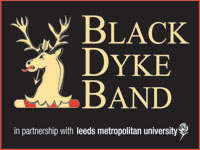Celebration Brass
17-Oct-2006By Kind Permission of the Dean and Chapter of York Minster
Black Dyke Band
Dr Nicholas Childs & Professor Philip Wilby
York Minster
Saturday 14th October
 As part of the 150th Anniversary celebrations in 2005, one of Black Dyke's major concerts was at York Minster with the ISB just two weeks before the National finals in London. Dyke went to York last year having won the British Open in September, this years concert at the Minster had that sense of déjà vu about it: Open Champions once again, and the concert being two weeks before they have a crack at the Nationals – it goes without saying that the band will be hoping that lightening doesn't strike twice as far as the result in London last year, and they get their hands on the trophy that eluded them taking European, British Open and National titles in a very special year.
As part of the 150th Anniversary celebrations in 2005, one of Black Dyke's major concerts was at York Minster with the ISB just two weeks before the National finals in London. Dyke went to York last year having won the British Open in September, this years concert at the Minster had that sense of déjà vu about it: Open Champions once again, and the concert being two weeks before they have a crack at the Nationals – it goes without saying that the band will be hoping that lightening doesn't strike twice as far as the result in London last year, and they get their hands on the trophy that eluded them taking European, British Open and National titles in a very special year.
Over 1500 people were in the Minster for what proved to be a cracking night's music-making. The opportunity to look at the architecture of the building, coupled with hearing Dyke in action, lured the audience to York including visitors from overseas of which one gentleman remarkably made the trip from Australia.
There's a line in Richard Evans' book (Dick the Stick) where Richard talks about Leyland's contesting performances at the Royal Albert Hall and their results. Richard says ‘we (as in the band) or I, never managed to understand how to play the Hall and I do believe there is a method'. This thought occurred to me during this concert as it takes a great deal of understanding how to make the most of the acoustic. The Minster is so big, that notes can disappear as quick as they've been played (and the further away you're sat from the stage, the less detail you hear) so it's important to chose music that is allowed to breathe, allowing the detail can be heard and Dyke's programme (with one or two exceptions) was constructed with the ambience and religious setting in mind.
By the time the band had concluded their first two numbers, the band had set the standard that it was intent on maintaining throughout the night.
The opening Intrada - Ein Fest Burg arranged by Ray Farr featured some fine cornet and percussion work, whilst Gregson's Laudate Dominion, music based around ‘O Worship the King' was taken at a steady tempo with some fine cornet and euphonium work, not too mention a resounding closing section where the main tune appears.
What joy to hear Philip Wilby's brilliant composition, Vienna Nights once again. Philip came on stage after the performance to acknowledge the applause for his work and having apologised for not giving a brief insight into his piece prior to the performance, quipped ‘follow that………'
Five weeks after victory in Birmingham, Dyke's performance was as fresh and disciplined as it was on contest day. The opening Freud's Dream was secure and some of the detail coming out within the Variations sent shivers down the spine. The Scena & Nocturno sections were pure gold, they just oozed class; it was just a real pity that in the concluding Alla Turca much of the detail within the music was lost within the acoustic.
Elgar's Nimrod was so peaceful on the ear, whilst the finale from Elgar's Enigma Variations was terrific stuff, big broad sounds, taken at a cracking tempo.
As always, Dyke's talented array of soloists didn't escape the spotlight throughout the night. Richard Marshall's Softly Awakes My Heart was so tender in its delivery whilst the effortless baritone sound of Gareth Brindle brought moments of tranquillity in Paul Lovatt-Cooper's arrangement of Donegal Bay.
Peter Roberts, was just, well, Peter Roberts in Memory from Cats before a laid back Brett Baker performed the old classic, Autumn Leaves. The final soloist of the night came from Dyke's euphonium soloist extraordinaire, David Thornton in Peter Meechan's air-varie based around Paginini's 24th caprice and entitled Devils Duel - they do say, leave the best till last – it was compelling listening.
The resounding triumphant sounds of Thine Be the Glory and the popular Jupiter were conducted by Philip Wilby. Howard Snell's arrangement of Bach's Arioso featured Gareth Brindle, Gareth Daniel, John French & David Thornton in unison.
Total silence had fallen on the Minster for the encore, Sullivan's Lost Chord, but moments earlier it had been ablaze with the sounds of Procession to the Minster, that grew and grew into a tumultuous climax with the soprano sound of Peter Roberts blending in before cutting loose towards the end as he glided over the top of the band. Peter's contribution led Dr Childs to go and lift him to his feet for a bow before acknowledging the other players.
The Queensbury outfit had certainly given the audience a night to remember and having appeared here two years on the trot, the Minster has welcomed the band with open arms and there's every chance they'll appear at the prestigious venue very soon.
Malcolm Wood









